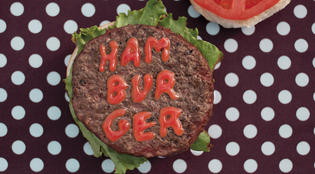 loading
loading
Arts & CultureYou can quote themHot dogs, hamburgers, and a painful truth about Louis' Lunch. Yale law librarian Fred R. Shapiro is editor of the <i>Yale Book of Quotations</i>.
 Photo illustration: John Paul Chirdon.View full image
Food inspires surprising levels of passion, and so does food nomenclature. In a column last year I discussed that American classic of cuisine and diction, the hot dog. Master etymologist Barry Popik had discovered that the term was widely used here in New Haven beginning in 1894—but not coined here: both he and I had found examples of 1893 occurrences in other US cities. Now new evidence suggests a possible answer to who did introduce the dog, or at least its name. The first clue was a slightly earlier use of hot dog that I recently turned up in a New Jersey paper:
Ben Zimmer ’92, executive producer of the wonderful website Visual Thesaurus, took this lead and ran with it. He writes that, in Paterson, “one man in particular was associated with the selling of hot dogs in the 1890s: Thomas Francis Xavier Morris—known locally, according to his 1907 obituary, as ‘Hot Dog’ or ‘Pepper Sauce’ Morris.” Zimmer researched Morris’s life and found that he was born in the West Indies, then worked in Europe as a circus performer before moving to New Jersey. An 1886 story described him: “As is well known he goes about the city supplying the saloons with Frankfort sausage, herring, and rolls.” In 1894 and 1897 he was referred to as the “hot dog man” of Paterson. It is not far-fetched to hypothesize that Morris may have been the coiner of hot dog. The great American culinary and linguistic rival to the hot dog is, of course, the hamburger. Its history too has been studied by Barry Popik, whose conclusion may be an unhappy one for New Haveners. Louis’ Lunch, the venerable New Haven lunch counter, is renowned for its tasty burgers (more than 90 percent lean, freshly ground every day, and broiled in antique cast-iron grills). Unfortunately Louis’ partisans have not been content to boast of its excellent food but have gone on to make an erroneous historical claim: that founder Louis Lassen invented the hamburger in 1900. This assertion has gained such a strong foothold in American pseudo-history that theNew York Times has repeated it at least 13 times. Barry Popik disproved this myth some years ago when he discovered the following passage in an 1873 issue of the Times: “We can have a Hamburger steak, which is simply a beefsteak redeemed from its original toughness by being mashed into mince-meat and then formed into a conglomerated mass.” Even Louis’s own contention, which is more limited—that in 1900 Lassen became the first to put bread around a beef patty, thereby inventing the “hamburger sandwich”—falls before Popik’s evidence. On October 22, 1896, the Kansas City Star noted: “Rare beefsteak chopped fine and seasoned with salt and pepper is an excellent filling for sandwiches.” The Reno Evening Gazette, August 25, 1893, wrote of “Tom Fraker’s celebrated Hamburger steak sandwiches.” And earliest of all, on July 19, 1881, one of New Haven’s own local papers—the Evening Register—mentioned a “chopped beef sandwich.” Louis’ Lunch’s burgers may be the best. But clearly they were not the first.
The comment period has expired.
|
|